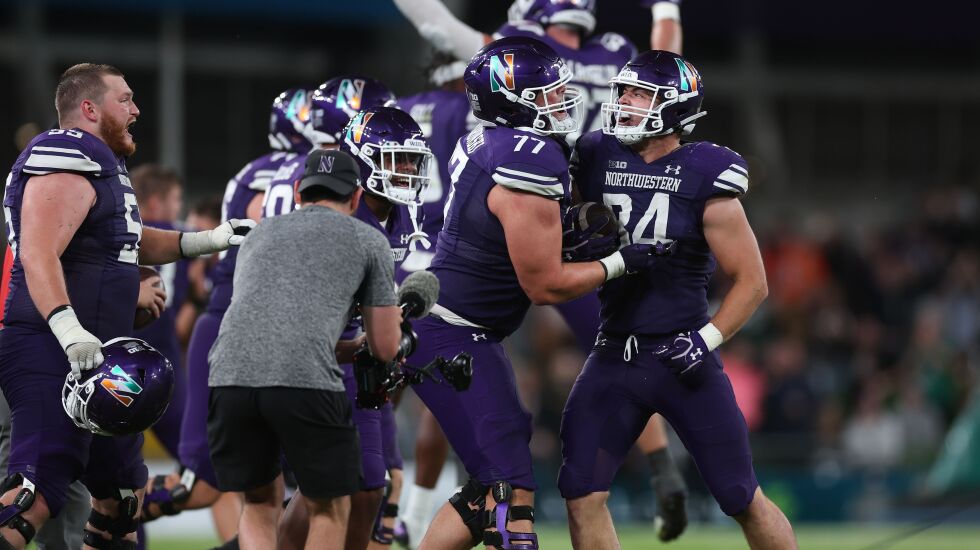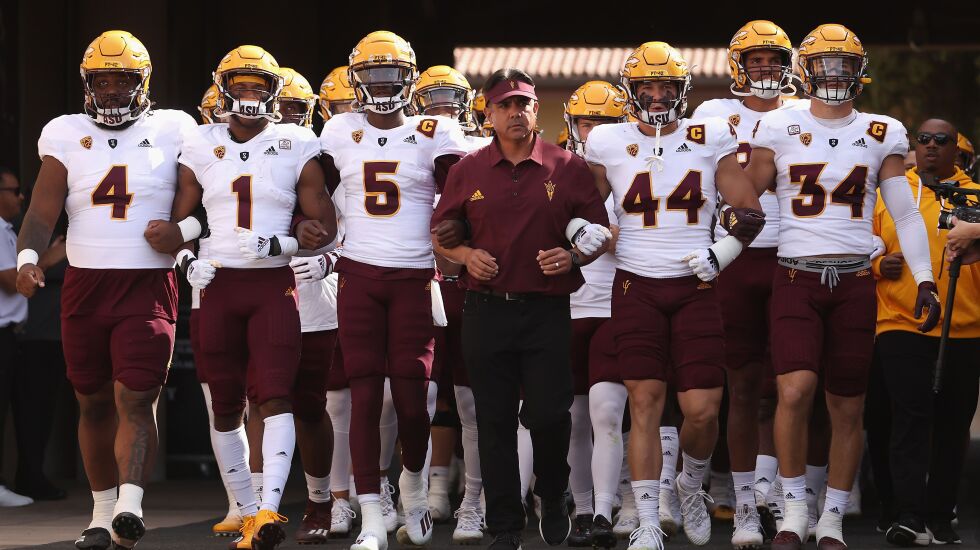
There’s something else going on at Northwestern, something aside from lawsuits and ongoing investigations in all their salacious detail. Something beyond speculation about what happens with fired coach Pat Fitzgerald from here, demands to know which administrators and assistant coaches knew what and offense taken at the very idea of an $800 million stadium rebuilding project going forward now, of all times for such a festal undertaking. Something that has nothing whatsoever to do with justice or retribution or righteous condemnation, or other sports programs and student-athletes.
That something is the onrush of a football season.
In the blink of an eye, training camps will be opening across the college football spectrum, which still includes Evanston, where the Wildcats were expected to have a trying 2023 season under even the best of circumstances. Ready or not — and they can’t be, can they? — the Wildcats will play on. Camp will start, and from there this whole Northwestern saga will move ahead on parallel tracks: on one, the lawsuits, investigations and salaciousness; and on the other, very likely, some awful football, disengaged fans and a team that could be in real danger of completely unraveling.
Can what’s left of the Wildcats stick together for four crucial months and avoid sinking into the abyss? Even if it seems like it doesn’t matter, it does.
There are kids and coaches and families and dreams, all hanging in the balance.
Fitzgerald’s last two Wildcats teams went a combined 2-16 in Big Ten play, and this next team might make the previous two look like world beaters. Or maybe it will be surprisingly competitive and end up somewhere other than at the bottom of the conference barrel, which some might even interpret as an ode to the winningest football coach in school history. But if the Wildcats are awful — throwback awful, to a time when many questioned if they belonged in the Big Ten — critics will line up to bury them.
It’s the sort of thing that happens when a program that gets little media coverage even in its own market envelopes itself in scandal.
Suddenly, an interim coach who never has been a head coach must do the coaching job of his life. That’s David Braun, who arrived in Evanston as defensive coordinator in January of this year — absolving him from the stains of a hazing investigation — after running defenses that helped win two Football Championship Subdivision national titles at North Dakota State.
Like seemingly everyone else embroiled in this Northwestern scandal, Braun isn’t talking publicly. He will have to, though, at Big Ten media days in Indianapolis next week.
Here’s something Braun said after taking the coordinator job — before everything blew up — in a video on Northwestern’s athletics website, when asked what advice he had for players: “Be kind, work hard and have fun. And I think if you can do those three things, if you can treat people the right way, if you can work really hard with uncommon work ethic and you have fun along the way, good things are going to happen.”
Be kind. Treat people the right way.
That seems to be the ticket out of this thing.
It reminded me of a little-known coach named Shaun Aguano, who took over on an interim basis at Arizona State last season — only three games in — after head coach Herm Edwards was fired. ASU was under investigation at the time for recruiting violations, dating to the COVID-19 dead period, and had just lost at home to Eastern Michigan, an egregious misstep, to fall to 1-2. There had been a player exodus via the transfer portal. Five coaches, not counting Edwards, had been jettisoned. But Aguano, who’d been a famed high school coach in the area, was untouched by the scandal and by the end of November had poured his heart and soul into an impossible season. And after he made it to the end of a brutal stretch, losing all but two of nine games, he was asked about the possibility of being kicked to the curb himself and cried.
“I’m so good because I took care of those kids,” he said. “I always will be a Sun Devil. This is one of the greatest things that’s happened in my life.”
So what happened to Aguano? Well, he didn’t keep the job. But ASU hired a hot young head coach, Kenny Dillingham, who asked him to stay on as an assistant. And Aguano did.
That’s the kind of love Northwestern needs right now and going forward.
ASU and Northwestern don’t seem a lot alike on the surface, but they are. ASU played in 11 bowls during Fitzgerald’s 10-bowl tenure, and won 112 games to Fitzgerald’s 110.

I called Aguano and asked him how he did it. How did he make a broken team of disillusioned players care enough to stay together, to stay out of the abyss?
“We needed to make sure we took care of the kids, the players,” he said. “It was the only thing that mattered. We coaches made a pact: Day by day, game by game, in situations we hadn’t handled before, let’s make sure we don’t quit on them. If we don’t quit on them, they won’t quit on us and they will play as hard as they can for us. Whatever the adversity part is, we were going to face it together.
“It came down to: What’s the light out there? It was being the best versions of ourselves inside and out.”
At the heart of it all was “ohana,” a term ingrained in Aguano throughout his upbringing in Hawaii that means family.
“The kids knew it wasn’t their fault,” he said, “and they knew we would care for them no matter what. You don’t have to walk that walk. You have to live that walk.”
Live that “ohana” — that’s what Northwestern must do now.
It’s just a football season, but this one matters. The abyss is beckoning. Or maybe, hopefully, something better.







